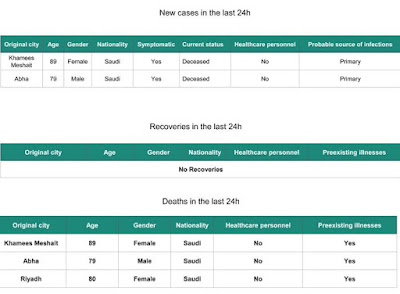#13,054
Daily reporting of MERS cases from the Saudi MOH is sometimes erratic, and since onset dates (or lab confirmed diagnosis dates) aren't provided, we never quite know how `current' these cases really are - particularly since there may be delays in reporting from some regions.
Previous analysis has shown that delays of 2 or 3 days is pretty common. So we take the `cases reported in the last 24 hours' label with a grain of salt.I mention this because the Saudi MOH is reporting two new Primary cases (no risk exposure listed) who have already died, along with the death of an 80 y.o. patient in Riyadh that I can't find a previous announcement on.
Typos on ages do sometimes occur, and that could easily explain the Riyadh case (we are also missing any report for January 3rd). But having two cases announced as having already expired suggests delays in either reporting or in diagnosis.
Hopefully it is the former, as early diagnosis and isolation is key in preventing nosocomial spread of the MERS virus. First the (Jan 10th) chart, then I'll return with a bit more.
In the first 10 days of January Saudi Arabia has already reported more MERS cases (9) than they did in all of December (n=8). Three have been linked to recent camel exposure, while 5 are primary (community acquired), and 1 was a secondary HCW exposure.
Additionally, 7 deaths and no recoveries have been reported thus far in January. MERS activity has been primarily reported from around Riyadh and the Khamis Mushait - Abha region.While we've yet to see any widespread community outbreaks, the virus continues to make jumps from camels into the human population, and we continue to see sporadic community acquired cases with no known risk exposures.
While MERS doesn't yet appear ready for prime time - a recent study (see A Pandemic Risk Assessment Of MERS-CoV In Saudi Arabia) which appeared in the November issue of the Saudi Journal Of Biological Sciences - suggests the virus wouldn't need to gain a whole lot more transmissibility to become a genuine pandemic threat.
Reason enough to keep close tabs on the latest reports from Saudi Arabia and the Arabian peninsula.

